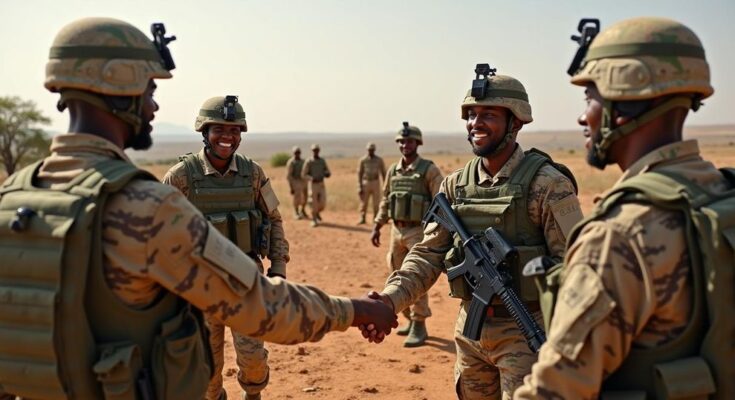The presidents of Somalia, Eritrea, and Egypt convened in Asmara to enhance regional security cooperation amid the ongoing threat from al-Shabab. They agreed on the importance of maintaining sovereignty and combating external interference, while addressing Somalia’s security challenges. The agreement raises potential tensions with Ethiopia, which has interests in the region, particularly regarding military presence and territorial disputes.
The leaders of Somalia, Eritrea, and Egypt convened in Asmara to strengthen their collaborative efforts on regional security in the Horn of Africa, especially as Somalia confronts the threat posed by the al-Shabab militant group. Eritrean President Isaias Afwerki took the initiative to host the summit, which included Egyptian President Abdel Fattah al-Sisi and Somalia’s President Hassan Sheikh Mohamud. In their joint statement, the leaders underscored their commitment to enhancing cooperation and fostering regional stability. They emphasized essential principles such as “unequivocal respect for the sovereignty, independence and territorial integrity of the countries of the region.” The trio acknowledged the necessity of addressing external interference in the internal matters of regional countries and committed to coordinated efforts to ensure lasting peace and cooperative development. Amid concerns regarding Somalia’s security situation, the agreement includes measures to combat terrorism, safeguard national borders, and uphold the territorial integrity of member nations. This security pact may heighten tensions with Ethiopia, which maintains a military presence in Somalia to counter extremist groups affiliated with al-Qaeda. Ethiopia and Somalia have experienced friction over Somalia’s agreement to develop a port in the disputed region of Somaliland, which seeks independence that is not internationally recognized. In light of Ethiopia’s actions, Somalia previously entered into a significant military partnership with Egypt, which agreed to contribute troops to a new African Union initiative targeting al-Shabab. This military collaboration comes against the backdrop of ongoing disputes between Egypt and Ethiopia regarding the latter’s construction of a hydroelectric dam on the Nile River. Furthermore, although Eritrea aligned itself with Ethiopian forces in the recent conflict against the Tigray People’s Liberation Front, lingering grievances regarding its exclusion from peace discussions continue to challenge relations. Notably, an Ethiopian Foreign Ministry spokesperson characterized the relationship with Eritrea as one marked by “good neighbourliness and good friendship.”
The meeting between the leaders of Somalia, Eritrea, and Egypt is set against a complex geopolitical landscape characterized by regional security challenges, particularly the ongoing conflict with the al-Shabab terrorist group in Somalia. The agreement to enhance security cooperation reflects efforts to stabilize the Horn of Africa, an area often afflicted by instability and conflict exacerbated by external influences. Additionally, the historical tensions between Ethiopia and Egypt, stemming from disputes over Nile water resources, further complicate the dynamics of regional cooperation and security. This meeting signifies a pivotal moment for regional alliances as countries navigate their interests in the face of common threats.
In conclusion, the summit among Somalia, Eritrea, and Egypt marks a concerted effort to jointly address security concerns in the Horn of Africa, particularly in light of the ongoing threat from al-Shabab. The commitment to mutual respect for sovereignty and cooperation against terrorism reflects a strategic alignment that could reshape regional dynamics. However, the implications of this collaboration may provoke responses from Ethiopia, pointing to a delicate balance of relationships that may further influence the security landscape of the region.
Original Source: www.aljazeera.com




